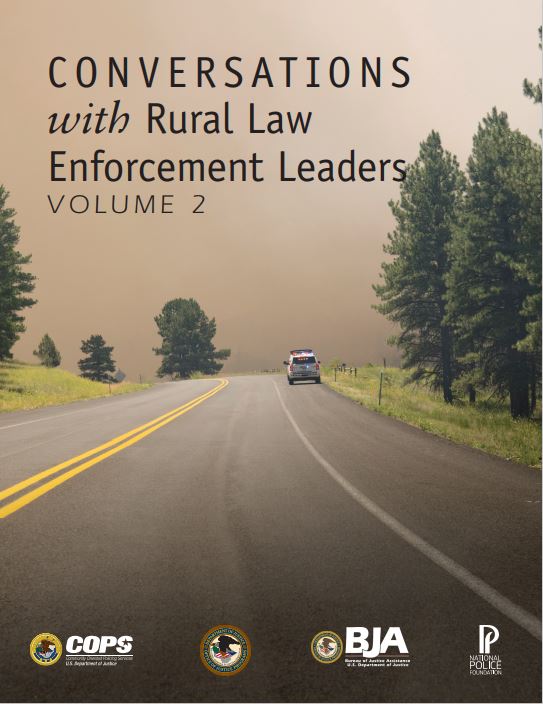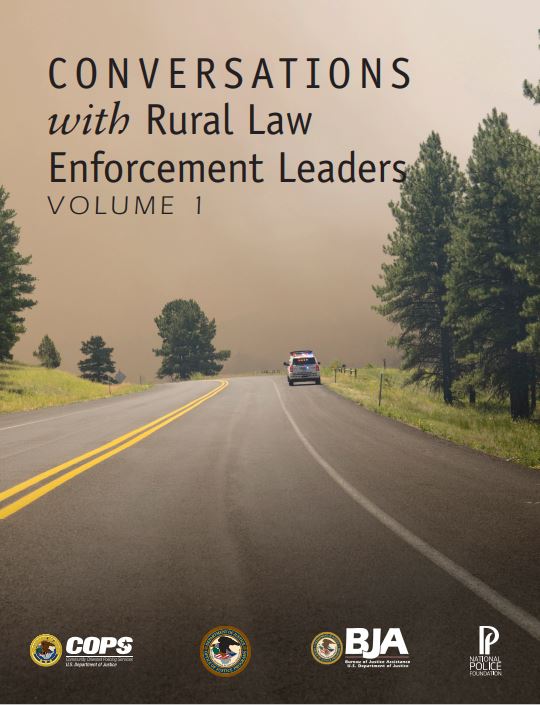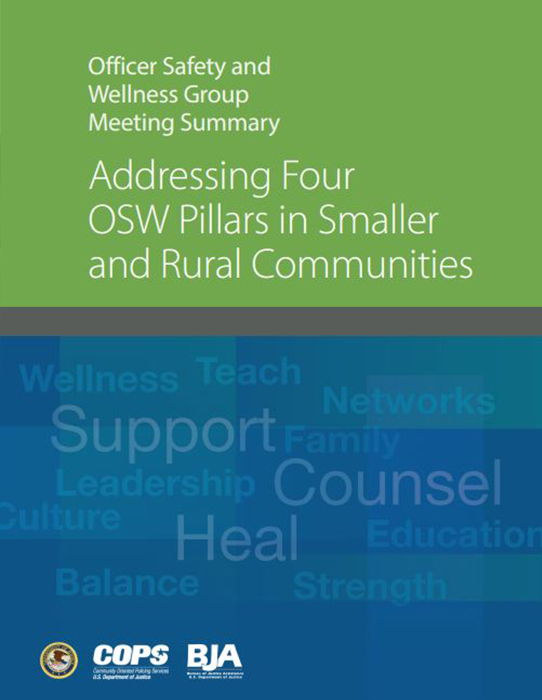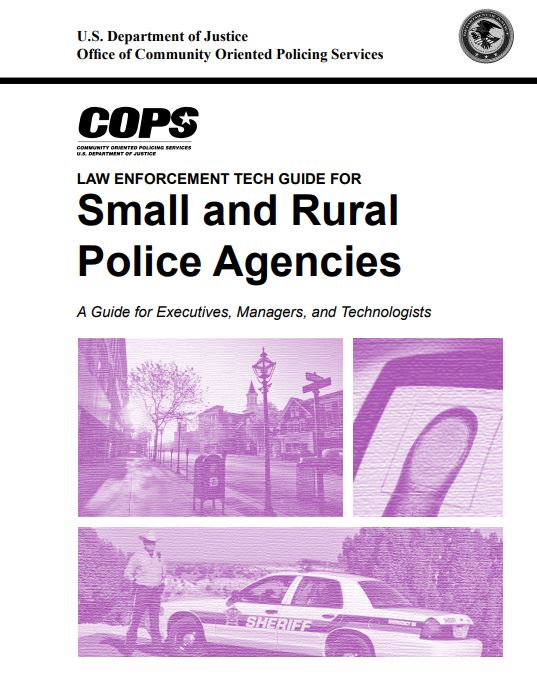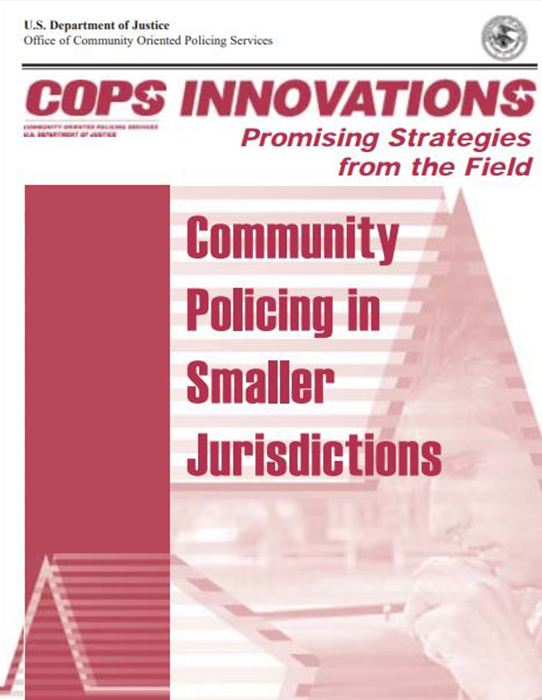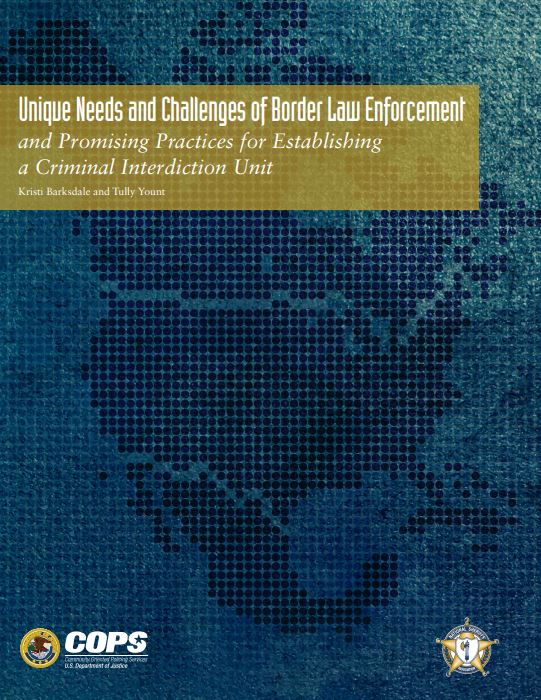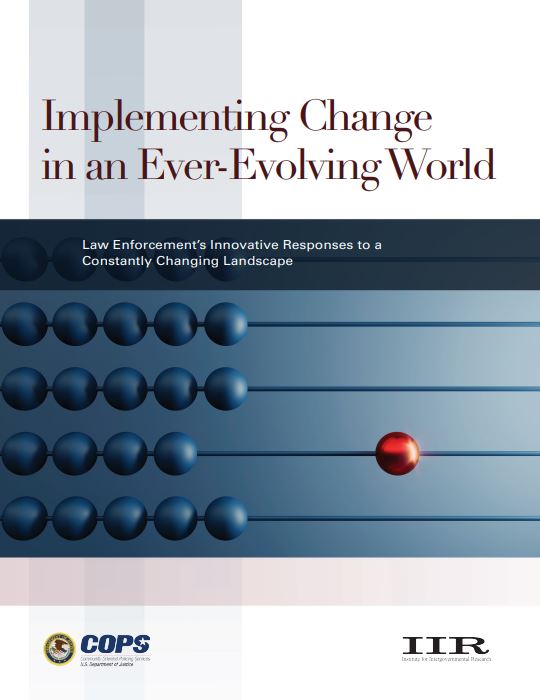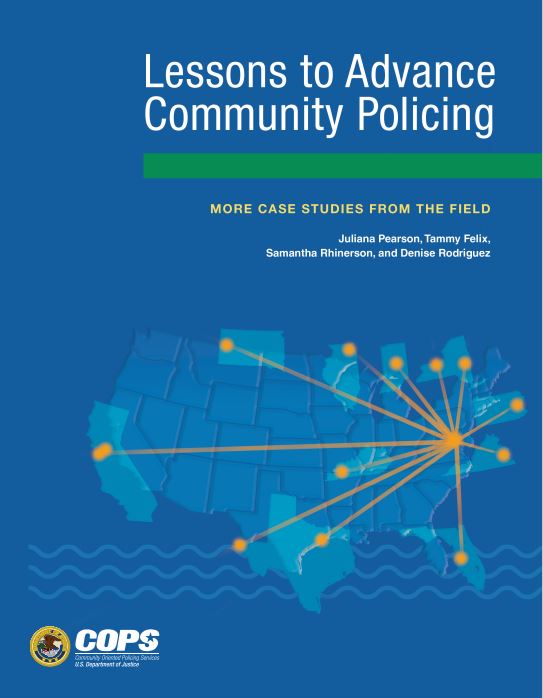More than two-thirds of law enforcement agencies in the United States serve small, rural, or tribal communities. The U.S. Department of Justice (DOJ) provides tailored resources specifically for law enforcement in small, rural, and tribal communities to help agencies reduce crime and keep their communities safe through effective community policing practices (additional tribal-specific resources can be found on the Tribal Community Policing Resources page). To support small, rural, and tribal communities in their public safety efforts, this website compiles relevant resources from the Office of Community Oriented Policing Services (COPS Office) and the Office of Justice Programs, Bureau of Justice Assistance (BJA).
Training and Technical Assistance
Advanced Law Enforcement Rapid Response Training (ALERRT)
ALERRT delivers training across the nation on operations and tactics to respond to active attack situations. Training is provided through federal and state funding at no cost to first responders and agencies, with the COPS Office being a major funding partner. While much of the training is delivered on-site in cities around the country, ALERRT also has a state of the art training facility in San Marcos, Texas, for advanced active shooter response training.
Collaborative Reform Initiative
The DOJ is committed to ensuring that law enforcement agencies across the nation serve all people with fair, equitable, and effective public safety practices. To that end, the COPS Office offers the Collaborative Reform Initiative Continuum of Technical Assistance Services to assist law enforcement agencies and the communities they serve in identifying and implementing organizational improvements and reforms through training, consultation, peer-based learning, analysis, and in-depth assessments.
-
The Collaborative Reform Initiative Technical Assistance Center (CRI-TAC) offers training and technical assistance on a request-and-deliver basis through a consortium of law enforcement stakeholder associations, subject matter experts (SME), and training providers. These engagements are narrowly scoped and conducted at the pace of the requesting agency.
CRI-TAC is launching a renewed focus on assisting smaller and rural law enforcement agencies. Smaller and rural agencies will continue to have access to the no-cost training and technical assistance that CRI-TAC is known for, but now CRI-TAC will provide training and technical assistance opportunities geared for the unique challenges confronting smaller and rural policing agencies. Through the Smaller and Rural Agency Initiative, agencies will be able to participate in training programs addressing areas such as active assailant response, multijurisdictional coordination, community partnerships, resource allocation, addressing hate crimes, report writing, duty to intervene, and crash reconstruction. To learn more and request assistance, please visit https://cops.usdoj.gov/cri-tac.
- The Critical Response program offers an intermediate form of technical assistance that includes issue-specific or after action reviews and reports or targeted assistance in the wake of a critical incident. In contrast to Organizational Assessment, this program does not involve ongoing implementation and technical assistance in the long term.
- The Organizational Assessment program offers a more intensive form of technical assistance, involving in-depth assessments and technical assistance on systemic issues that challenge community trust and confidence. These engagements are the most comprehensive.
Crime Analyst in Residence Program (competitive TTA program)

The BJA Crime Analyst in Residence (CAR) program is designed to help law enforcement agencies expand their use of data analysis and analytics to manage their operations and practices.
Using a hybrid approach of onsite and virtual technical assistance, the CAR Training and Technical Assistance (TTA) Team will help law enforcement agencies integrate tailored crime and data analysis practices, products, tools, and information more fully into their daily operations and crime reduction efforts.
The CAR TTA Team will work closely with the program participants to assess and build their capacity to solve cases, identify crime patterns, develop problem-solving approaches, and implement crime-reduction strategies.
National Training and Technical Assistance Center (NTTAC)

The mission of the BJA National Training Assistance Center (BJA NTTAC) is to build safer and stronger communities through proactive, responsive, and innovative training and technical assistance. Organizations within the criminal legal system often work with limited resources. Whether the challenge is time, funds, or expertise, organizations don’t always have the ability to start new initiatives or even address issues as they arise. BJA NTTAC exists to help fill these gaps, keep organizations moving forward, and ultimately create safer and stronger communities.
To do so, BJA NTTAC provides innovative, no-cost TTA to organizations in the law enforcement, courts, corrections and reentry spaces. BJA NTTAC uses a cadre of SMEs with a wide variety of expertise across the criminal legal system to assess the needs of organizations and tailor solutions unique to each community’s needs.
Place-Based Policing for Small and Rural Agencies
Place-Based Policing for Small and Rural Agencies, an eLearning course, provides learners with the opportunity to explore concepts in various, applicable contexts. The modules, designed for all law enforcement professionals from leadership to frontline officers, demonstrate place-based policing practices that reduce crime and are specifically tailored to small and rural agencies.
Course Provider: IACP
VALOR Initiative (TTA Program)
The Officer Robert Wilson III Preventing Violence Against Law Enforcement Officers and Ensuring Officer Resilience and Survivability (VALOR) Initiative is an effort to improve the immediate and long-term safety, wellness, and resilience of our nation’s law enforcement officers. Through a multifaceted approach that includes delivering no-cost training (professional education), conducting research, developing and providing resources, and establishing partnerships that benefit law enforcement officers, the VALOR Initiative seeks to provide our law enforcement with innovative, useful, and valuable resources and skills.
Funding Opportunities
These solicitations may not be currently accepting applications; however, we encourage you to explore the program pages and the How To Apply and the Office of Justice Programs (OJP) Grant Application Resource Guide to prepare for future opportunities.
Community Policing Development (CPD) Microgrants
Funds to develop the capacity of law enforcement to implement community policing strategies to improves the identification and prioritization of community problems; build trust and relationships between law enforcement and the communities they serve; and enables an agency to build a culture toward accountability, transparency, open communication, and mutual trust.
Community Policing Development (CPD): Supporting Law Enforcement Agencies in Seeking Accreditation
Funds to support law enforcement agencies seeking accreditation. Under this solicitation, the COPS Office will fund costs related to obtaining accreditation from an existing law enforcement accreditation entity.
Coordinated Tribal Assistance Solicitation / Tribal Resources Grant Program
Funds to address the most serious tribal law enforcement needs; increase the capacity of tribal law enforcement agencies through prevention strategies, improved criminal investigations (human trafficking, missing or murdered Indigenous persons), and crime control, including illegal drugs (methamphetamine, opioids); and implement or enhance community policing strategies.
COPS Hiring Program (CHP)
Funds to support the hiring or rehiring of career law enforcement officers to increase an agency's community policing capacity and crime prevention efforts.
Law Enforcement Mental Health and Wellness Act (LEMHWA) Implementation Projects
Funds to improve the delivery of and access to mental health and wellness services for law enforcement through the implementation of peer support, training, family resources, suicide prevention, and other promising practices for wellness programs.
Promoting Access to Crisis Teams (formerly CIT)
Funds to support the implementation of crisis intervention teams, including embedding behavioral or mental health professionals with law enforcement agencies, training for law enforcement officers and embedded behavioral or mental health professionals in crisis intervention response, or a combination of these.
Rural and Small Department Violent Crime Reduction Program (site-based funding and TTA)
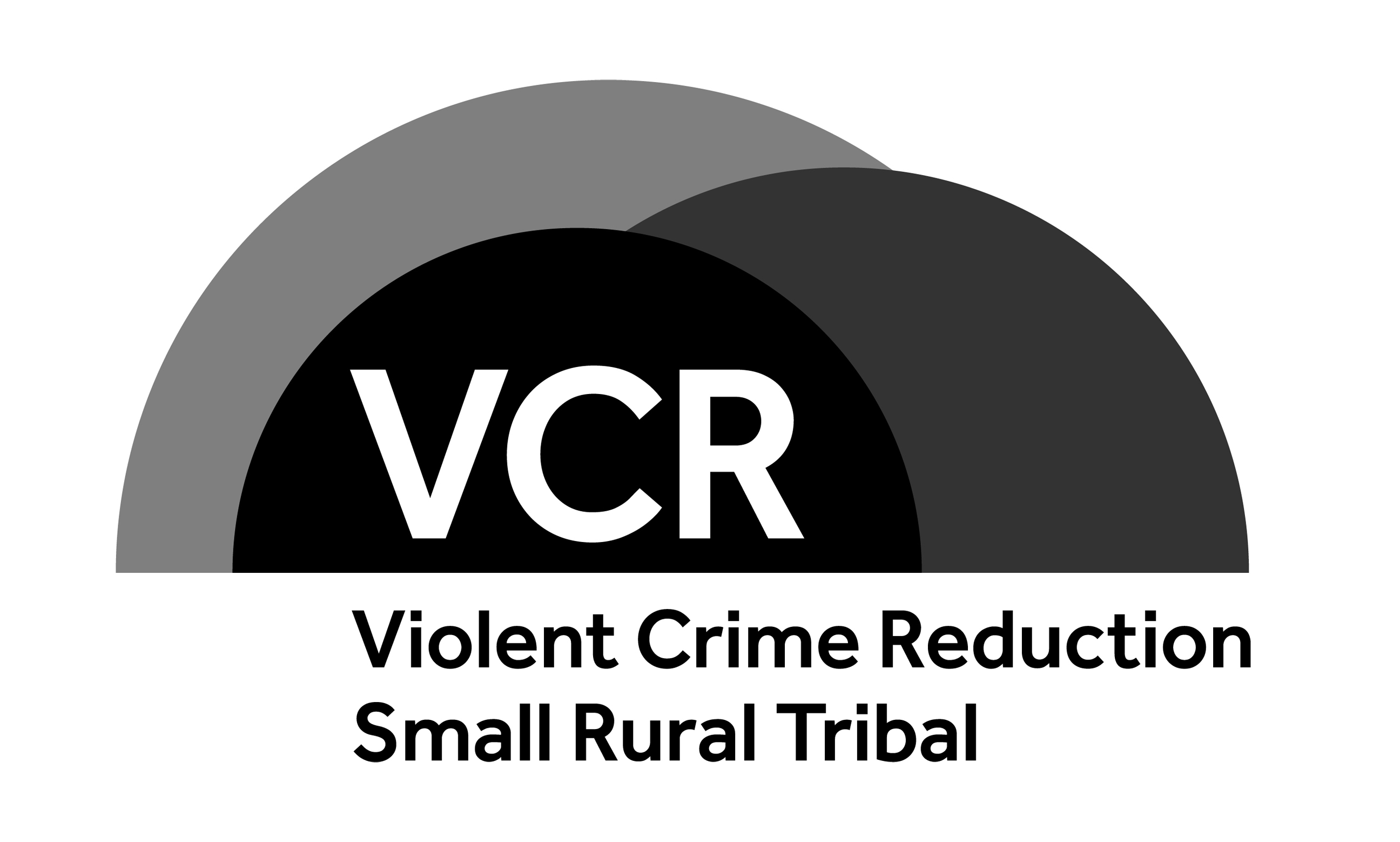
The goal of this program is to increase the capacity of police departments or prosecutors’ offices to fully implement programming and activities that reflect critical elements found in the Violent Crime Reduction Operations Guide or the Prosecutors' Guide to Reducing Violence and Building Safer Communities to combat violent crime.
Rural Violent Crime Reduction Initiative (site-based funding and TTA)

The Rural Violent Crime Reduction Initiative (RVCRI) is an effort, funded by the BJA, to provide funding and assistance to rural law enforcement agencies seeking to reduce violent crime and address problems associated with violent crime. Funding and support are available for implementing violent crime reduction strategies, improving investigations, improving services to victims, and for enhancing collaboration between local stakeholders.
Safer Outcomes: Enhancing De-Escalation and Crisis Response Training for Law Enforcement – Support for Law Enforcement Agencies
Funds law enforcement agencies seeking to implement training and related supports on this topic. Training is supported for law enforcement officers, support personnel employed by law enforcement agencies, and mental health professionals working on crisis intervention teams as employees of a law enforcement agency or under a legal agreement with a law enforcement agency.
School Violence Prevention Program (SVPP)
Funds to improve security at schools and on school grounds in the award recipient’s jurisdiction through evidence-based school safety programs and technology.
Small, Rural, Tribal (SRT) Body-Worn Camera Program (site-based funding and TTA)
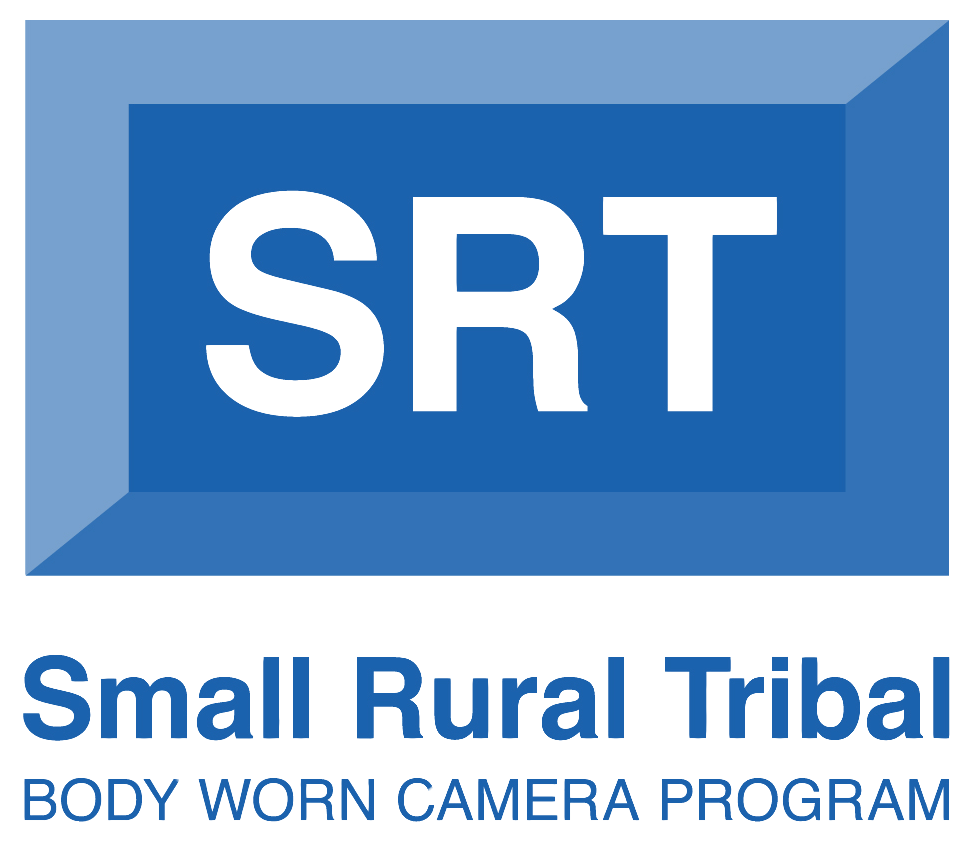
The SRT microgrant program is funded by the BJA and operated by Justice & Security Strategies (JSS), Inc. The purpose of this initiative is to provide funds and technical support to small, rural, and tribal agencies to implement body-worn cameras.
STOP School Violence (site-based funding and TTA)
The STOP School Violence Act of 2018 was created to improve school safety and security by providing students, teachers, and officers with the tools they need to recognize, respond quickly to, and prevent acts of violence. The STOP School Violence Act provides funds to the DOJ through the BJA and the COPS Office to support grantees. The BJA offers three-year grants to states, units of local government, tribal government, public agencies, and nonprofit entities that include private schools to improve security within K–12 schools and on K–12 school grounds through evidence-based school safety strategies and initiatives.
Dispatch Newsletter Articles

Critical Incident Review of the Response to the School Shooting in Uvalde, Texas
February 2024
Alaska Natives Develop a Grass Roots Solution to a Serious Crime Problem
November 2023
A Peer Support Team in Rural Maine
September 2023
New Crime Reduction Resources for Small, Rural, and Tribal Agencies
October 2022
CALEA Accreditation is for Smaller Agencies Too!
March 2022
Concerns of Rural Law Enforcement: What We Heard from the Field
September 2019
Small Towns, Big Crowds: Policing Tourist Destinations
August 2019
Arkansas’ Criminal Justice Institute Offers Invaluable Sexual Assault Training to Rural Agencies
April 2018
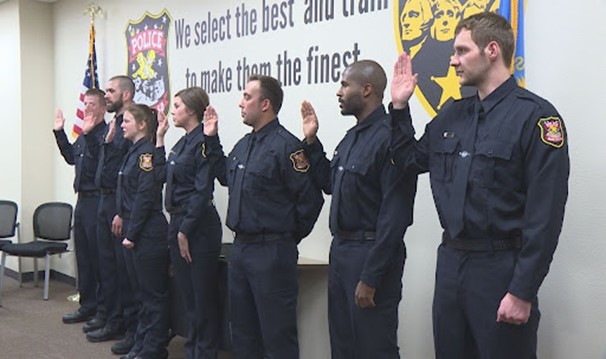
Recruitment and Retention Strategies from Rapid City
Recruiting and retaining high-quality law enforcement officers has been a struggle for departments across the United States over the last few years. The Rapid City (South Dakota) Police Department was one of those agencies but turned things around in 2023 through a holistic approach that addresses a wide variety of factors that influence who joins the department and is retained. ![]() Discover on Apple Podcasts | Listen/Download MP3 | Read Transcript
Discover on Apple Podcasts | Listen/Download MP3 | Read Transcript

Wounded in the Line of Duty: One Park Ranger’s Story
Brody Young is a Utah State Parks Ranger who was shot nine times and left to die in a remote location and is back on the job today. Ranger Young speaks candidly about the incident, his recovery, and how the experience has changed his life. ![]() Discover on Apple Podcasts | Listen/Download | Read Transcript
Discover on Apple Podcasts | Listen/Download | Read Transcript
Season 2 | Episode 1: Officer Suicide feat. Sheriff Tim Whitcomb of Cattaraugus County, NY
We are all familiar with the truism that policing is a hard job. However, for the women and men who do the job, that statement is more than just a simple adage. The physiological and emotional toll paid by officers in the United States is an inherent part of the job that only those who have worn the uniform can fully understand. In this episode of What’s New in Blue, Sheriff Whitcomb tells the heartfelt story of a fellow officer’s suicide that became his wake-up call and spurred his crusade to help law enforcement officers minimize and dissipate the effects of post-traumatic stress disorder (PTSD).
Resources and Information
Ask Bob Q & A for Law Enforcement Agencies : Do You Have Body-Worn Camera Related Questions?
Cambridge (MA) Police Commissioner Robert “Bob” Haas retired with more than 40 years of experience in policing. He has extensive knowledge in policing reform measures, operational assessments, and community engagement. Most importantly, he is here to help by answering your questions!
Ask Mike Q & A for Prosecutors : Do You Have Body-Worn Camera Related Questions?
Michael Green is a former district attorney from Monroe County, New York. He possesses a wealth of knowledge on criminal justice reform and can provide a unique lens on body-worn camera usage and implementation from a prosecutorial perspective.
Body-Worn Camera Policy Wizard for Small, Rural, and Tribal Agencies
The development and creation of a body-worn camera policy is an important aspect of any body-worn camera program. It serves as the foundation for your program and is an inherent part of your implementation efforts. JSS and Arizona State University have created a tool that will provide you with the basics for building that policy.
The policy wizard is based on extensive analysis of policies from more than 450 agencies across the country and on the experiences of experts who have reviewed those policies. The policy wizard will result in a draft of your policy that you can edit, finalize, and submit to JSS for review and approval.
Crime Analysis Model Tool and Publications
Features crime analysis tools and publications developed as part of BJA CAR program that works mostly with smaller agencies.
Crime Analysis Presentations, Webinars, and Workshops
Features crime analysis presentation, webinars, and success stories developed as part of BJA's CAR program that works mostly with smaller agencies
Crime Analysis Product Templates
Features crime analysis tools and publications developed as part of BJA Crime Analyst in Residence (CAR) program that works mostly with smaller agencies
National Law Enforcement Roadway Safety (NLERS) Program
The National Law Enforcement Roadway Safety (NLERS) Program provides a suite of no-cost training, technical assistance, and resources to local, state, and tribal law enforcement agencies with the goal of preventing officer injuries and fatalities on the nation’s roadways from officer-involved collisions and struck-by incidents.
National Suicide Awareness for Law Enforcement Officers (SAFLEO)
The National Suicide Awareness for Law Enforcement Officers (SAFLEO) Program’s mission is to educate law enforcement officers and agencies to better understand the causes of suicide through providing training and meaningful resources focused on mental wellness and suicide prevention. SAFLEO offers dynamic trainings that are grant-funded and available for all levels of law enforcement, both in person and virtually.
Public Safety Partnership Virtual Academy
BJA has developed interactive, virtual courses on law enforcement topics identified to be of great importance and shared interest for law enforcement professionals. These courses are available nationwide at no cost to requesting law enforcement professionals.
Rural and Small Department Violent Crime Reduction Program
The goal of this program is to increase the capacity of police departments or prosecutors’ offices to fully implement programming and activities that reflect critical elements found in the Violent Crime Reduction Operations Guide or the Prosecutors' Guide to Reducing Violence and Building Safer Communities to combat violent crime.
Rural Violent Crime Reduction Initiative
The Rural Violent Crime Reduction Initiative (RVCRI) is an effort, funded by the BJA, to provide funding and assistance to rural law enforcement agencies seeking to reduce violent crime and address problems associated with violent crime. Funding and support are available for implementing violent crime reduction strategies, improving investigations, improving services to victims, and for enhancing collaboration between local stakeholders.
STOP School Violence Program (National Center for School Safety)
The National Center for School Safety (NCSS) is focused on improving school safety and preventing school violence. We are the BJA STOP Program TTA provider.
STOP School Violence Specialized TTA for Law Enforcement
This clearinghouse provides a one-stop shop for law enforcement and school safety professionals to access relevant TTA as well as a comprehensive resource library that features publications, websites, trainings, webinars, videos, and podcasts aimed at addressing specific aspects related to enhancing school resource officer programs, school safety, and school climate.
VALOR for Blue
The VALOR Officer Safety and Wellness Program is dedicated to preventing injuries to and deaths of law enforcement officers and the people they serve and improving the health and resilience of officers.
Violent Crime Reduction Roadmap
The roadmap is organized around 10 essential actions to reduce community gun violence identified by the Council on Criminal Justice (CCJ)—an independent, nonpartisan think tank for the criminal justice field. In 2022, CCJ launched a Violent Crime Working Group representing a diverse array of experts from community organizations, law enforcement, the public health sector, and academia. The working group’s final report—Saving Lives: Ten Essential Actions Cities Can Take to Reduce Violence Now—summarizes its recommendations across 10 key steps every jurisdiction should take to reduce violence.
Webinars for Small, Rural, and Tribal Body-Worn Camera Programs
Features topical and awardee-focused webinars for BJA's Small, Rural, and Tribal Body-Worn Camera Microgrant Program
Contact Us
COPS Office
Thank you for your interest in the COPS Office. We are eager to answer any questions you may have and are very interested in hearing your thoughts on our work and on community policing in general. Please use the contact information below to get in touch with us.
The Response Center can assist you with questions regarding our programs as well as connect you with our community policing experts and resources.
The Response Center's hours are Monday – Friday, 9:00 a.m. to 5:00 p.m. ET.
Response Center Email: askCopsRC@usdoj.gov
Response Center Phone: 800-421-6770
BJA
 Official websites use.gov
Official websites use.gov Secure .gov websites use HTTPS
Secure .gov websites use HTTPS 



